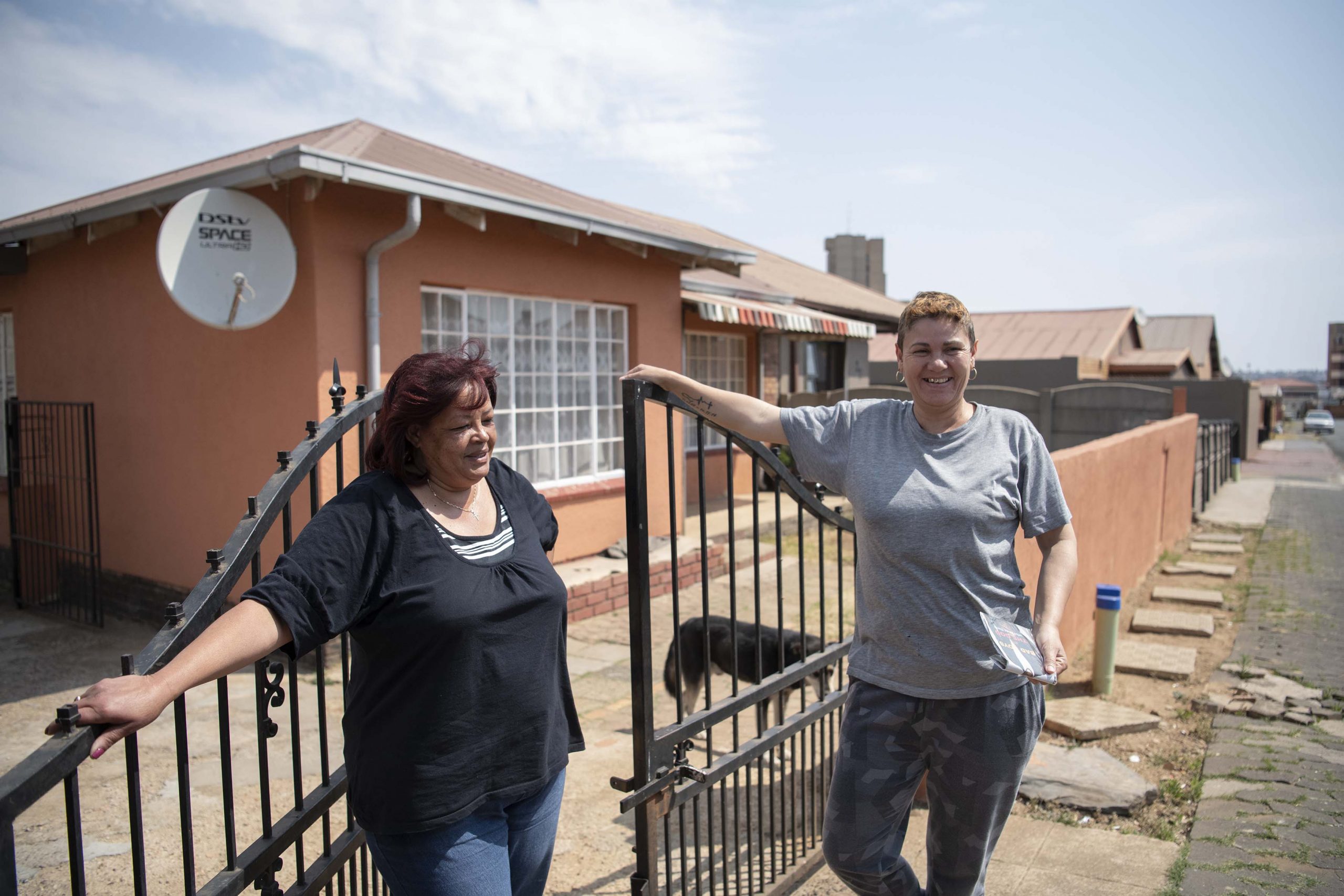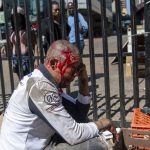Taking a stand against xenophobic aggression
A group of women banded together to protect migrants in their Coronationville street from an approaching violent mob, but they aren’t the only ones standing up for their neighbours.
Author:
6 September 2019

Nathalie van Rooyen and a small group of other women decided “enough was enough” when a mob approached “their” spaza shop in Coronationville earlier this week.
Van Rooyen, 47, Celeste Cameron, 53, and other South African women living in Malmesbury Street in Coronationville, west of Johannesburg, grabbed whatever they could find – hockey sticks, broomsticks and other household items they could use to defend themselves – and ran to protect the spaza shop they make use of almost every day.
As the looting spread from other parts of Johannesburg to Coronationville, it crept slowly towards them.
“For me, it was about the shop and it was about the boys doing this. But I also took it personal. It’s our own people doing this,” Van Rooyen said, sitting next to Cameron in her living room.
Related article:
The Johannesburg central business district and surrounding areas have been plagued by violent, xenophobic plundering for the past week. It started with a call for a “shutdown” and targeting of “foreigners” accused of committing crime and causing other social ills.
The pillaging started in Jeppestown on Sunday 1 September and by Monday morning had spread to other areas of Johannesburg, including Germiston and Malvern, where dozens of businesses and cars were set alight.
The violence made its way to Coronationville on Tuesday 3 September, when mobs started attacking migrant-owned businesses in the area. During the chaos of the looting, and desperate to save their businesses, two South African men were shot and killed in Coronationville and neighbouring Crosby.

Killings and arrests
Hundreds of people have been arrested for involvement in the xenophobic marauding and theft in Gauteng. On Thursday night President Cyril Ramaphosa broke his long silence and said at least 10 people had been killed during the week’s violence.
“Over the past few days, our country has been deeply traumatised by acts of violence and criminality directed against foreign nationals and our own citizens,” Ramaphosa said in a television broadcast amid growing pressure for him to address the continuing xenophobic brutality.
Related article:
“As I speak to you, the debris of several days of violence and looting continues to litter many of the streets of our country,” he said. “No amount of anger and frustration and grievance can justify such acts of destruction and criminality.
“There can be no excuse for the attacks on the homes and businesses of foreign nationals, just as there can be no excuse for xenophobia or any other form of intolerance.”
Ramaphosa confirmed that the police had arrested 423 people in Gauteng since the frenzied attacks began.

Community spirit
He called on each and every South African to “work together” to end the violence and insisted that it had “largely subsided”.
But it was the spirit of community that forced Van Rooyen, Cameron and the other women of Coronationville to protect one of their own.
“They are just trying to earn an honest living. They wouldn’t hurt anyone. If they can’t stand up for themselves, who will?” Van Rooyen asked. “These are our guys. If I am short of R5, they will say it’s fine.
“We are tired of what is going on in our community. We, as parents, are also willing to take a stand and say ‘enough is enough’,” she said. “We just wanted to protect those guys. And wanted to show those guys [the looters] it is not easy to come to our street and do this. We are fighting for our street and we are fighting for Coronationville.”
Cameron added: “We are very peaceful, quiet people. But we are gatvol [fed up]. You can only take so much.”

Standing up to the mob
It wasn’t only in Coronationville that individuals, communities and organisations stood up to the indiscriminate and destructive xenophobic ransacking that erupted across the province. Marikana activist Napoleon Webster, who had recently been cleared of a dubious murder charge, travelled to Johannesburg to engage with people in Hillbrow and other parts of the city.
“I was touched when I saw how we treated our fellow human beings. I never had that thing of treating people differently. I treat people equal. You know, a human being is a human being. I judge you based on your character, not on your religion, where you’re from and so on,” he said.
Related article:
Webster has been involved in some of the meetings taking place between non-governmental organisations and other interest groups, but he also organised people in Hillbrow to stand up against the mobs that were targeting migrants.
“We had teams, we recruited people from all over. Zimbabweans, Nigerians, everybody. We live in Hillbrow, we will defend Hillbrow. And if you are in Hillbrow, you are part of the community of Hillbrow. That is what we are preaching,” he said.

Changing perceptions
On the afternoon of Thursday 5 September, Webster was walking the streets of Johannesburg and engaging with people, asking them about their views on migrants and, if necessary, challenging them.
At the corner of Von Brandis and Frederick streets in Marshalltown, he met Karabo Nkosi, 28, from Reitz in the Free State and Sibu Ntombela, 32, from Mtubatuba in KwaZulu-Natal. Both men are unemployed, with Nkosi watching and washing cars to make a living and Ntombela still searching for a job after losing his a few years ago.
Related article:
The men told Webster they thought migrants were to blame for many of the problems in South Africa, and they perpetuated stereotypes about migrants being undocumented and responsible for the proliferation of drugs, crime and other social ills, and for them not finding work.
After speaking to the two for more than half an hour, Ntombela agreed that migrants weren’t actually to blame for most of the issues he had mentioned earlier. “Actually, there must be order. Everyone who is here must have proper documentation and they must be traceable,” he said. “But government needs to do better. This thing is not going to stop if government doesn’t do something.”

Mobilising residents
In Thembelihle, south of Johannesburg, the Thembelihle Crisis Committee has managed to keep the violence at bay and protect migrants in the area. Bhayiza Miya, a member of the committee and a local leader, said the anger people were directing towards migrants was misplaced.
“When these attacks started, some of the shops, they had to close down and remove their stock. As the Thembelihle Crisis Committee, we called an urgent meeting amongst ourselves. We were trying to mobilise the community to say ‘no’ to these attacks,” he said.
“The people we voted for are in power. So the people who owe us answers, even for undocumented migrants and all of those, are the people we voted into power,” said Miya. “Focus your energy and frustration on the people we voted into power, not a Somalian shop owner. The people we voted into power might be the ones causing these attacks. Why am I saying it? These are easy targets.
“There are two factors to this, there’s inequality and there’s unemployment. Poverty definitely plays a role in this. Our brothers and sisters from other countries aren’t responsible for that. They are living with us in our community.”
Related article:
Miya said people from Thembelihle had taken to the streets to ensure the safety of migrants and the committee was working hard to remind people whom they should hold accountable.
“There are people in power. We have never voted any Somalian, any migrant. We have voted people into power, those who are stealing from us today. So whatever frustration or whatever anger we want to vent, we vent it to them because they are the ones holding whatever we want,” Miya said.

Fear and solidarity
Etilde Eugene is from Mozambique. She runs a small spaza shop in Thembelihle with her husband, selling mostly vegetables. Eugene said she is fearful despite not having had any issues. “I am scared. The business is still open because we don’t have problems here. But I am still scared.”
In KwaZulu-Natal, shack dwellers’ movement Abahlali baseMjondolo has a long history of keeping xenophobic violence out of the areas in which they have branches.
“We have always worked to build the unity of the oppressed from below, and in struggle. There has never been a xenophobic attack in any of our branches, or in any area where we are strong. Since 2008, we have committed ourselves to shelter and defend anyone under attack and we remain committed to a living politic of solidarity,” said Abahlali baseMjondolo earlier this week.
Stopping attacks on migrants will take greater government commitment to tackling the country’s broader and longstanding structural problems, a growth in progressive movements such as Abahlali baseMjondolo and the continuing courage of people like Van Rooyen and Cameron.





